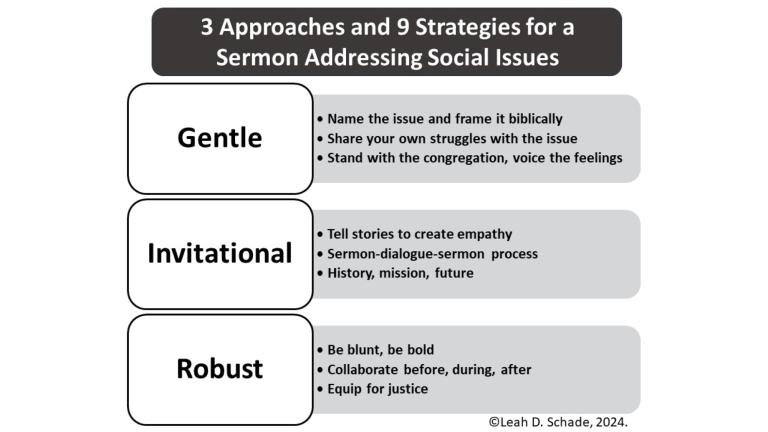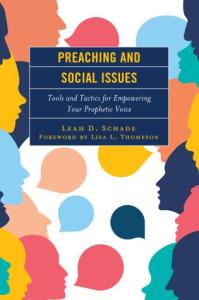Mark 10:35-45 is the Gospel reading in the Revised Common Lectionary for Oct. 20, just three weeks before Election Day. Here are election season sermon ideas using Gentle, Invitational, and Robust approaches.

Before looking at Mark 10:35-45, let’s address the elephant in the room.
Can preachers mention the election in sermons?
Yes, preachers are free to discuss the themes and issues relevant to an election – as long as they refrain from endorsing specific candidates. In fact, many congregants appreciate when their ministers offer biblical, theological, and ethical insight on social issues that impact their lives, families, and communities.
In this article, I explained the do’s and don’ts of what clergy and congregations can say and actions they can take when it comes to politics.
Keep in mind that the biblical writers spoke to the social and political issues of their time because God is concerned with the well-being of all people. This means that it’s not only permissible for preachers to discuss the election, but it is also their moral and ethical duty to relate the Bible and theology to the issues that are relevant today, particularly as people prepare to exercise their right to vote.
But HOW a preacher talks about the election in their sermon also matters.
I developed an Assessment Tool for preaching and social issues which you can take here. This 5-minute online tool will help you think about your approaches to preaching and social issues using a three-dimensional questionnaire that measures: (1) your own vulnerabilities and strengths, (2) the characteristics of the congregation you serve, and (3) the quality of relationships within the congregation and between the congregation and yourself.
Gentle, Invitational, and Robust Approaches
Based on your score from the Assessment Tool, you’ll see that I suggest three approaches to a sermon addressing a social issue: Gentle, Invitational, and Robust. This is a framework I developed for my book Preaching and Social Issues: Tools and Tactics for Empowering Your Prophetic Voice to help ministers choose which path works best for them and their context.
The Gentle approach…
is for clergy who are in situations where there may be personal or congregational stress, the congregation is new to sermons addressing social issues, or there is vulnerability on the part of the preacher.
The Invitational approach…
is recommended for congregations that are ready for a more challenging message by way of dialogue and building bridges of listening, empathy, and understanding.
The Robust approach…
is for clergy and congregations who are ready to be fully engaged in public theology and to put their faith into action on social issues.
I suggest three strategies for each approach, for a total of nine in all. You can read about these approaches in more detail in my book. In the meantime, here’s a graphic with a quick summary:

For this installment on election season sermon ideas, I’ll begin with a brief exegetical summary of the passage and suggest connections to election issues. Then I’ll offer Gentle, Invitational, and Robust sermon ideas that you can use in your preaching context.
[Did you miss the sermon ideas for Oct. 6 and 13? Click here!]
Oct. 20, 2024
Twenty-second Sunday after Pentecost: Mark 10:35-45
Exegetical summary
This dialogue among the disciples and Jesus takes place just after the third time he announces his impending death. They are about to enter into Jerusalem when this internal controversy erupts. As Jesus is teaching them, he references the “servant song” in Isaiah 53:4-12 and also v. 45 about giving his life as a ransom for many. This sets the stage for what is to come in his crucifixion.
The presenting issue is: who will be in closest proximity to Jesus when he comes into his power? James and John want to sit at Jesus’s right and left hand (the seats of honor next to the king). The other disciples fear losing out on the prized seats of power. This leads to anger among them.
But Jesus tries to reorient their understanding of what true power means and what it involves.
In telling this story, the author of Mark’s Gospel is instructing his church about what kind of community they should be and how they should understand power. Their use of power is not to imitate the violent hierarchy of Rome. Instead, it should model the distributive power of the Realm of God that honors and serves all.
Thus, Jesus is breaking open binary thinking about power that believes when others have it, I don’t.
Also, his words are meant as foreshadowing. There is a double entendre going on here. When he references the cup and baptism, this is about his suffering as a result of serving others in the face of the domination system.
Interestingly, when Jesus comes into his power (crucifixion) the ones on his right and left are not the disciples at all. They are criminals (Mk. 15:27). And attending him in his “court” are the women (Mk. 15:40-41). Thus, Jesus inverts Rome’s honor-shame paradigm because those without honor and power are the ones who are closest to Jesus.
This teaching has important implications for Christians who vote for the leaders who will represent them.
Connections to election issues
Notably, Jesus did not shut down the conversation with James and John when they came at him with such audacity. He engaged with them and the rest of the disciples. This was a “teachable moment” with them.
Likewise, as we approach the election, there are teachable moments for us as well.
It’s important for the church to engage in dialogue about what it means to have power, exercise power, share power, and confront abuses of power.
Like the disciples, we may be shocked to hear Jesus declare their rulers as “tyrants.”
This term has been used in our own political discourse and may require some unpacking. But in this election cycle there are definitely choices to be made about the kind of leaders we want.
Our choices today should be guided by the desire for a life and economy rooted in a governing system where there is fair representation of the people’s interests – not just those in leadership. This leads to a healthy, sustainable balance where power is shared equitably and supports the common good.
In contrast, a life and economy ordered by Caesar (and today’s Caesar-like rulers) dictates that people and land must be exploited and extracted to create wealth that flows upward to the elite, not shared with the community.
With this exegesis and connection to election issues in mind, here are three approaches to preaching on Mark 10:35-45.

Gentle approach: Stand with the congregation, voice the feelings.
The preacher can invite listeners into an imaginative space where they stand among the disciples listening to James’s and John’s request to sit at Jesus’s right and left hand. It’s not fair! Peter has been called “The Rock”; doesn’t he deserve to be at the top? What about me? Aren’t I smart enough? Rich enough? Good looking enough? Athletic enough?
What does it feel like to be left out of the decision-making process? To be on the outside looking in, where people discuss your body, your rights, your livelihood, and your healthcare without consulting you?
Conversely, what would it be like to live in a society led by people who embody servant leadership? What would be different if we had leaders who listen to the people they serve? How would it feel to have your voice heard and your body matter? How would things change for the better in our workplaces, schools, homes, and even our own congregation?
Invitational approach: History, mission, future.
This strategy uses a congregation’s history as well as its current mission to help them envision their prophetic future. Given that Jesus challenges the disciples to live in a more equitable, more sustainable covenantal relationship with neighbors and God, in what ways has your church done this in the past? Today, how is their ministry of serving others inspiring them to engage in advocacy on behalf of the downtrodden and oppressed?
Especially with the upcoming election, how can the church make space for holding the tensions around issues of faith and politics? And beyond the election, how can we be a place that invites dialogue about how to reorder our economy around covenantal relationships that honor people, planet, and God?
Robust approach: Collaborate before, during, and after.
For this strategy, the preacher works collaboratively with members of a congregation on the sermon process. The preacher gathers a group of individuals who covenant with each other to listen deeply to lived experiences of those impacted by the issue, think critically about the challenges of addressing the issue, and work creatively to craft a collaborative sermon that engages the congregation.
In this sermon process, the preacher and collaborators would be rooted in Mark’s premise that there is an important standard God uses to judge political leadership: how well it supports the care and protection of those most vulnerable.
The group could explore different ways to activate moral and theological responses as we approach our national election. They can examine the voting records and public statements of candidates in local, state, and national levels and ask: what are the policies that affect our community most directly or urgently?
To be clear, the sermon would not draw conclusions about which candidates Christians should support. Rather, they would share what the group had discerned about which issues they should pay attention to during this election and beyond.
Following the sermon, the group can host a feedback session to listen to what the congregation heard, how they felt, what they learned, and what they might do in response moving forward.
Bottom line – model servanthood
No matter what approach or strategy preachers work with during the election season, there are some key things everyone can do that model the servanthood of Jesus during the election season. These include:
- Praying for public servants
- Encouraging people to vote
- Advocating for policies that are in the best interest of those most vulnerable and the common good
May God bless your discernment, dialogue, preaching, and ministry during this election season!
Stay tuned for sermon helps for Oct. 27 and Nov. 3!
Read also:
Preaching the 2024 Election Season: Sermon Ideas, Oct. 6, 13
What Clergy Can Say (and Not Say) During the Election Season
Preaching 2024 Election – How will Clergy Navigate Issues?

The Rev. Dr. Leah D. Schade is the Associate Professor of Preaching and Worship at Lexington Theological Seminary in Kentucky and ordained in the ELCA. Dr. Schade does not speak for LTS or the ELCA; her opinions are her own. She is the author of Preaching and Social Issues: Tools and Tactics for Empowering Your Prophetic Voice (Rowman & Littlefield, 2024), Preaching in the Purple Zone: Ministry in the Red-Blue Divide (Rowman & Littlefield, 2019) and Creation-Crisis Preaching: Ecology, Theology, and the Pulpit (Chalice Press, 2015). She is the co-editor of Rooted and Rising: Voices of Courage in a Time of Climate Crisis (Rowman & Littlefield, 2019). Her book, Introduction to Preaching: Scripture, Theology, and Sermon Preparation, was co-authored with Jerry L. Sumney and Emily Askew (Rowman & Littlefield, 2023).













